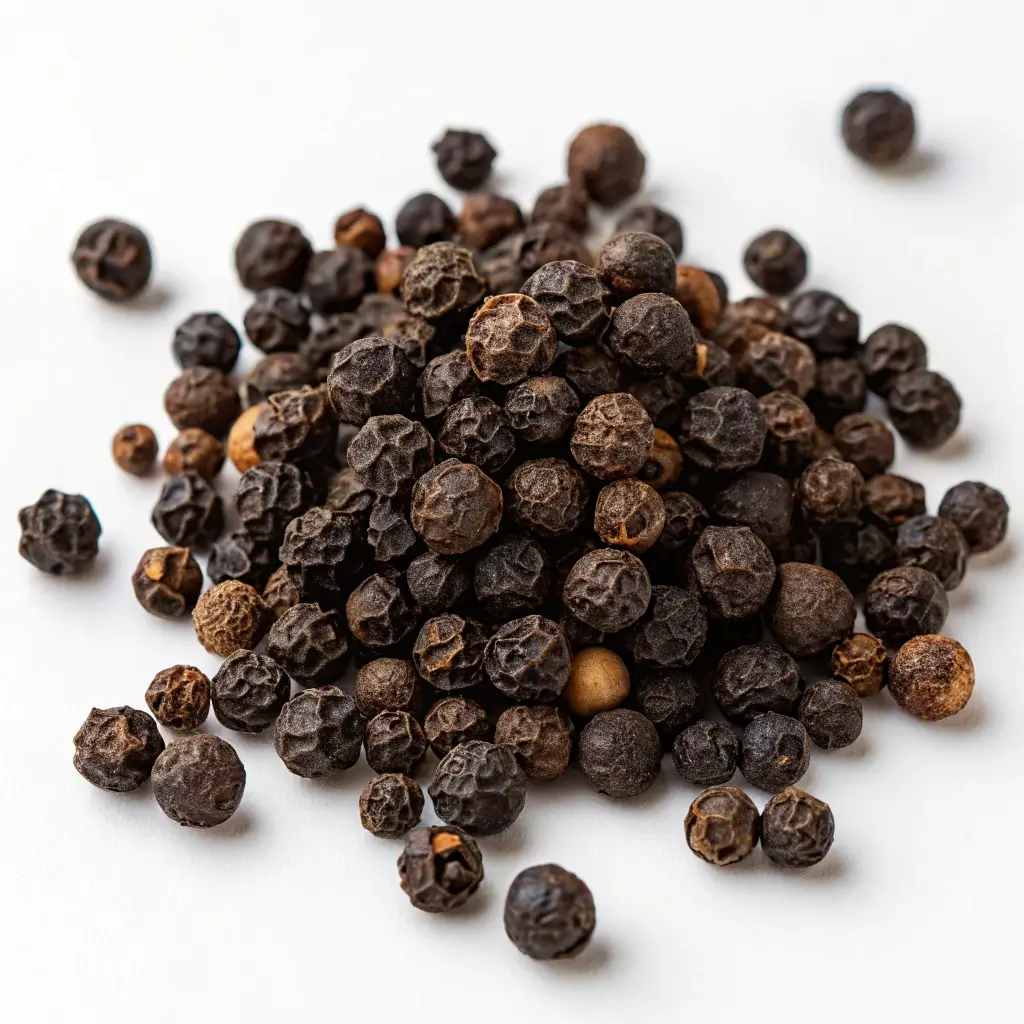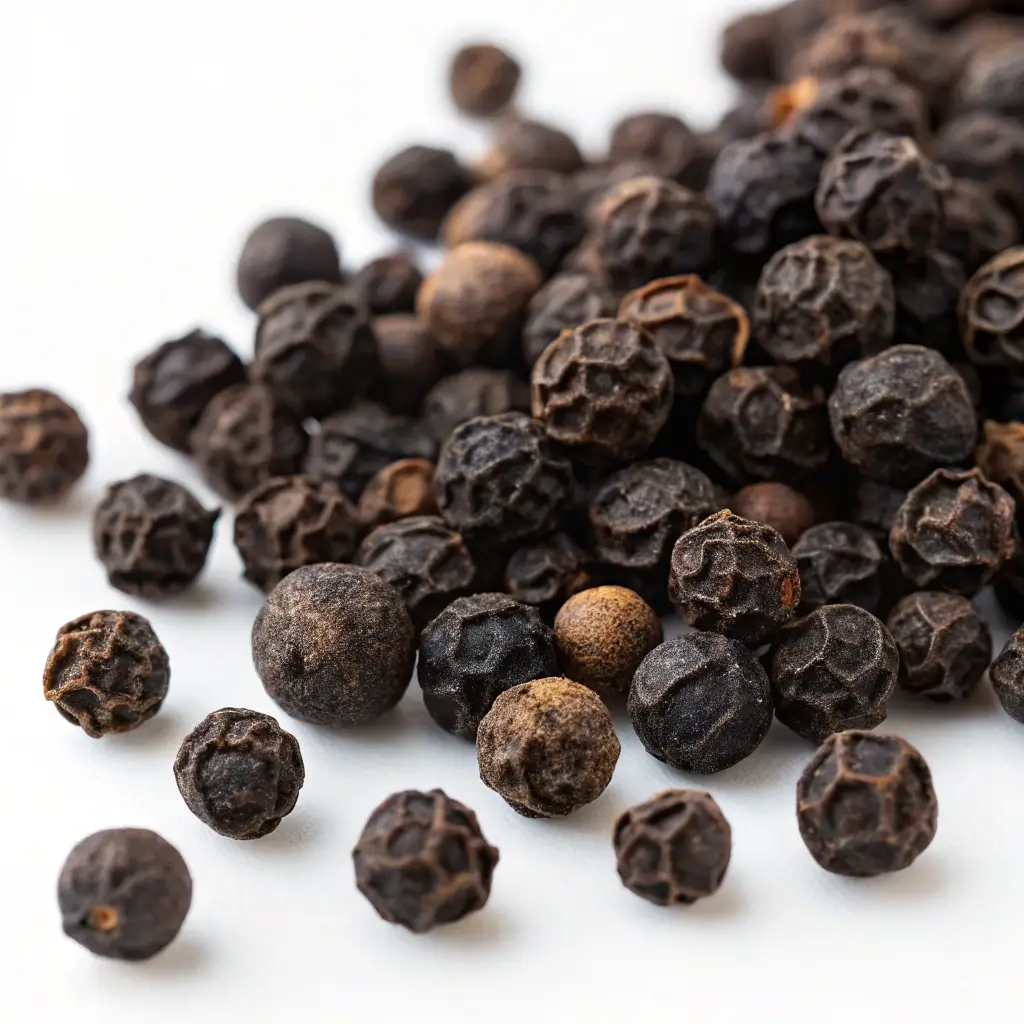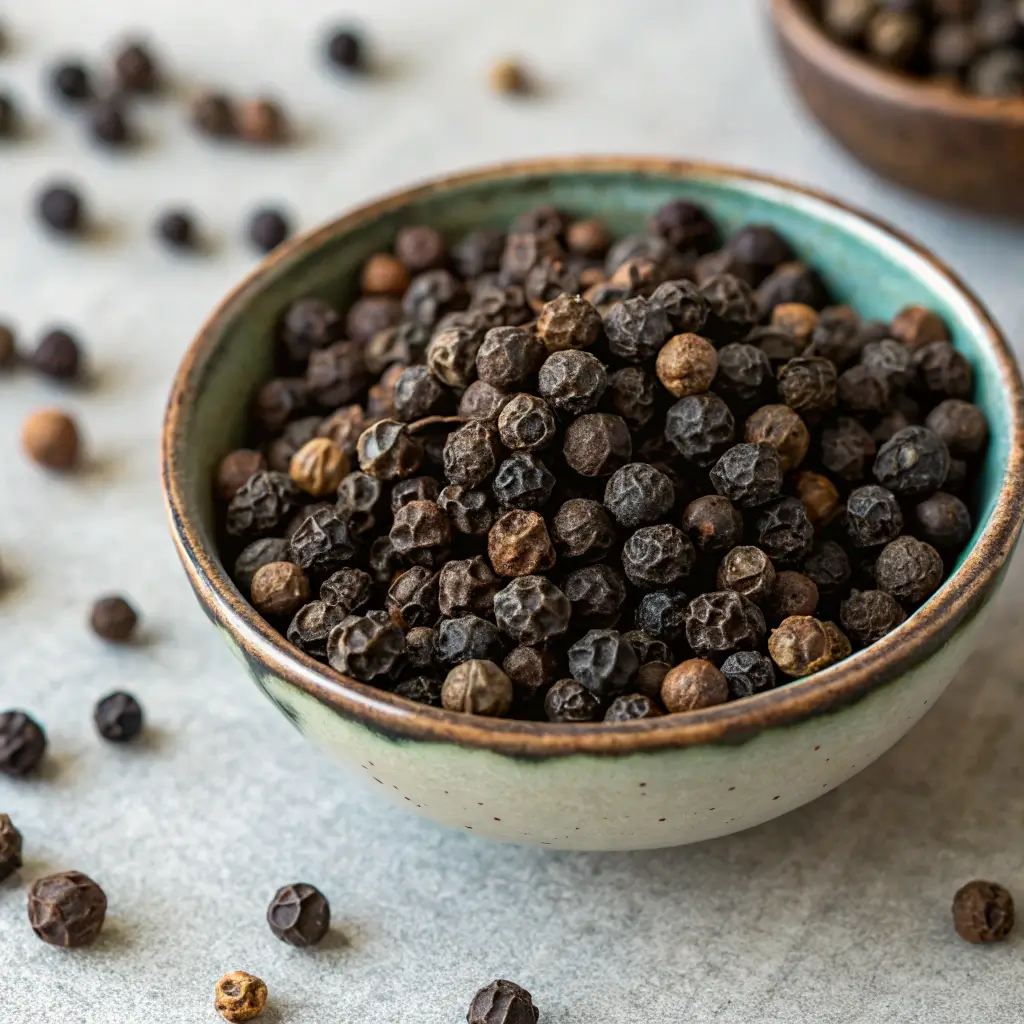Often taken for granted, black peppercorn is more than the spice we sprinkle on everything. Known as the “King of Spices,” it’s one of the most commonly used seasonings worldwide, but it also holds a rich history in traditional medicine, trade, and wellness practices. Black peppercorns are not just for flavor. They have many health benefits supported by science. They help with digestion and increase nutrient absorption. Whether you’re a home cook or a wellness enthusiast, understanding the full value of black peppercorns can enhance both your kitchen and your health.
What Is Black Peppercorn?
Black peppercorn is the dried fruit of the Piper nigrum plant. It is picked when unripe and then sun-dried. This process makes the skin turn black and wrinkled. These tiny spheres are the most common form of pepper used worldwide and are known for their bold, pungent heat and complex flavor profile. Whole black peppercorns keep their essential oils and health benefits until they are freshly ground. Unlike ground black pepper, which can lose its strength over time. Black peppercorn has been used in traditional medicine for centuries. It is a common spice and a natural remedy for digestive and inflammatory problems.
Black Peppercorn Benefits
They are packed with piperine, a bioactive compound that gives them their sharp flavor and many of their health benefits:
✓ Enhances Nutrient Absorption
Piperine increases the bioavailability of nutrients like curcumin, selenium, and vitamin B12, making your body absorb more from the food and supplements you consume.
✓ Supports Digestive Health
Black pepper stimulates the secretion of hydrochloric acid in the stomach, which is essential for breaking down food. This can help reduce bloating, gas, and indigestion.
✓ Anti-Inflammatory and Antioxidant Properties
Black pepper has antioxidants that help neutralize harmful free radicals. It may help reduce inflammation, which is linked to chronic diseases like arthritis and heart disease.
✓ Promotes Metabolic Function
Preliminary studies suggest that black pepper may assist in fat metabolism, making it a helpful addition to weight management routines.
Black Peppercorn Plant
Black pepper come from the Piper nigrum plant, a tropical climbing vine native to South India. The plant produces small round berries called drupes:
- When harvested early and sun-dried with the outer skin, they become black peppercorns.
- The same plant can also produce white peppercorns, green, and red, depending on the harvest time and processing method.
The Piper nigrum vine thrives in humid climates and is now cultivated in India, Vietnam, Indonesia, and Brazil. It can grow up to 13 feet tall and takes 3-4 years to begin producing berries.

Black Peppercorn Sauce
Black peppercorn sauce is a rich, flavorful addition to a wide range of dishes. Common in Western and Asian cooking, it is made by mixing crushed black peppers with cream, stock, butter, or soy sauce.
While it’s not a health food, using good black pepper in sauces lets you enjoy its benefits. It also improves the flavor of:
- Steak and grilled meats
- Tofu and plant-based proteins
- Stir-fries and roasted vegetables
If made with wholesome ingredients, black peppercorn sauce can be a flavorful, low-sugar way to elevate healthy meals.
Black Peppercorns Substitute
Out of black peppers? Here are the most effective substitutes:
- White peppercorns: Milder flavor, suitable for light-colored dishes
- Green peppercorns: Less pungent, fresher flavor; ideal in sauces
- Paprika or cayenne: Offers heat but different flavor notes
- Allspice: Slightly sweet and peppery, though not a perfect match
Use ground alternatives when appearance doesn’t matter, but keep in mind that flavor and heat levels vary.
Black Peppercorn Grinder
Grinding your black peppercorns fresh ensures the highest potency. Here’s why and how to choose the right grinder:
- Why grind fresh? Whole peppercorns retain oils and compounds that begin to degrade once ground.
- Best grinders: Choose ceramic or stainless steel grinders. Ceramic is best for preserving essential oils.
- Settings: Adjustable grinders allow for coarse or fine grinds depending on the dish.
Always store peppercorns in an airtight container away from light and heat.
Black Peppercorn Taste
The taste of black peppercorn is distinct and multidimensional:
- Pungent and spicy: Provides heat without overwhelming the palate
- Earthy and citrusy: Adds complexity to dishes
- Lingering warmth: Stimulates the senses without numbing
It goes well with many foods. This includes savory dishes like meats and eggs, and even sweet ones like strawberries and dark chocolate.

Science-Backed Benefits of Black Peppercorn
Modern studies support what ancient traditions have claimed for centuries:
- Increases nutrient bioavailability: Piperine enhances the absorption of curcumin by up to 2000%.
- Reduces inflammation: Animal studies suggest black pepper may help reduce chronic inflammation.
- Improves cognitive function: Preliminary research links piperine to improved brain function and reduced oxidative stress.
Source: National Institutes of Health (NIH), Journal of Food Science and Nutrition
Conclusion: The Everyday Spice with Extraordinary Benefits
They are a staple spice that deserve more recognition for their wellness potential. From boosting digestion and brain health to enhancing the flavor of nearly any dish, they offer a powerful punch in a tiny package.
Next time you reach for the pepper grinder, remember: you’re not just seasoning your food, you’re supporting your body. You may want to learn about black and white peppercorns and the difference between them.
If you found this article helpful, feel free to share it with a friend, leave a comment, and make sure you Follow on Facebook.
FAQs
Is black peppercorn the same as black pepper?
Yes. Black peppercorns are the whole spice, while black pepper usually refers to the ground version. Grinding fresh from whole peppercorns gives better flavor and potency.
Are black peppercorns good for you?
Absolutely. They support digestion, nutrient absorption, and inflammation control. They’re one of the most accessible health-promoting spices available.
Why is black peppercorn so expensive?
High-quality peppercorns are often hand-harvested, sun-dried, and carefully graded. Price also depends on origin, size, and oil content.
What do black peppercorns taste like?
They have a sharp, spicy flavor with woody, earthy, and citrusy notes. The heat builds slowly and lingers without overwhelming the palate.




